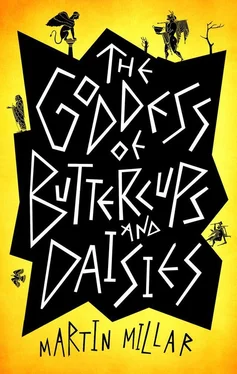‘What do you want?’
‘Flute player, dancer and poet reporting for duty,’ announced Luxos. ‘Part of tonight’s entertainment.’
The servant eyed Metris. With her pretty face and a flute round her neck, she could be a hired musician. As for Luxos, she wasn’t convinced.
‘You’re a dancer?’
‘Yes. And a talented poet to boot.’
‘Poets,’ grunted the servant, in a tone which suggested she wasn’t a devotee. ‘The house is already full of them.’
‘Old-fashioned, past their prime, no doubt. I’m here as part of the new generation.’
‘And to fill yourself up with as much food as your stomach will hold, I expect,’ said the servant, shrewdly. She was on the point of refusing them entry when she noticed Metris smiling at her. There was something about the nymph’s smile that was hard to resist. It felt as if she was transferring some primal form of happiness.
‘Fine. Come in. Entertain the crowd. But keep out of our way in the kitchens.’
At the edge of the agora, Laet pointed out the Altar of Pity. ‘Rather an important shrine.’
Idomeneus was unimpressed. ‘It looks like a useless old piece of rock. Why is it important?’
Laet stood beside the ancient altar, examining it carefully. It was worn down, so eroded with age as to be almost featureless. ‘It’s the place of last resort. Athenians come here when everything else has failed. When you’ve been to all the temples, and asked every god for help, and your hope has gone, you can come here. There’s no special prayer to say. No particular offering has to be made. You just ask for pity.’
She placed her hand above the small altar. ‘Can you feel it?’
‘Feel what?’
‘All the desperate pleas of Athenians down the ages.’
Idomeneus couldn’t feel anything. He remained silent. Laet’s eyes glinted. She laid her hand on the altar. There was a sharp crack as it split in two and fell in the dust. Without another word, she walked away. Idomeneus hurried after her.
‘Did you just destroy the Athenians’ last hope?’ he asked, catching up with her.
‘I believe so.’
‘Isn’t that more than Kleonike asked you to do?’
‘Probably. It’s never really wise to engage my services. If people are foolish enough to do so, they must live with the consequences. I do like to do a very thorough job. Which reminds me — Aristophanes now has a price on his head, if you’re interested.’
At Callias’s house there is much pleasure
For he has crabs for dinner, rays besides,
and hares, and women with light twinkling feet
Eupolis, The Flatterers
There were torches on the porch, illuminating the entrance to Callias’s house, and rows of oil lamps inside. Few people could afford to burn so much lamp oil these days; Callias was not averse to displaying his wealth. Aristophanes trudged inside in the wake of Eupolis and Leucon, whom he’d met in the street outside. He’d managed to remain civil, though if it had been a longer street, he’d probably have started an argument.
Callias greeted them in the hallway. He was a stout man, though not outrageously so, given his enormous fortune and healthy appetite. His parents and grandparents were important Athenians, statesmen with rich connections to the silver mines. Callias wasn’t a statesman, or even a renowned man of business. He was mainly known for spending money.
Though he does still have some aspirations to be regarded as a thinker, reflected Aristophanes, noticing the statue of Solon the Wise in the hallway. I’ve seen him hanging round Socrates, pretending he knows what the philosopher is talking about.
‘Eupolis! Leucon! Aristophanes! Our three comic geniuses! You honour me by coming to my house. I do hope none of you are going to satirise me this year!’
Aristophanes imagined he’d like nothing better than to be lambasted from the stage. It was a sort of fame; even a mark of honour. At least it meant you were important enough to be talked about. Politicians didn’t enjoy it, but a man like Callias would take it in good part. Cleisthenes, a well-known Athenian with many theatrical connections, always laughed uproariously when Aristophanes mocked his effeminacy.
Callias led them through into his main dining room, which was vast, and illuminated by more oil lamps than any of the diners had ever seen lit at one time in a private dwelling.
‘I know you’ll have us all laughing after we’ve eaten!’
Eupolis and Leucon laughed easily in Callias’s company. That was the right thing to do. There was no sense in not laughing with the rich man when you were in his house, eating his food. Unfortunately for Aristophanes, he was in too poor a temper to join in.
‘Are they serving wine yet?’ he asked, but no one heard him. Callias was spluttering at some joke from Eupolis. Eupolis was young, like Aristophanes. He’d started in the theatre early, like Aristophanes. They had a lot in common. Aristophanes was disliking him more every minute.
There were over a dozen couches in the dining room. Callias’s symposium was on a larger scale than most. Some of the guests who’d arrived early were reclining together on the couches, some were still standing. Socrates was there, in the corner, sitting quietly. Servants were bringing in platters of food, meat and fish, and Callias was bragging about how he’d personally visited the market that day, to make sure only the best produce was used.
‘I’ve hired the finest cook in Athens! You won’t believe what he does with pastry. Eupolis, I met Simonides at the market, he’s your producer this year, isn’t he? He was buying a huge amount of paint from that new Theban stallholder, was that for your scenery?’
‘Yes, we’ve got a lot of expensive decoration going on,’ replied Eupolis. ‘I had to hire three new painters this week.’
‘Is there a wine shortage?’ demanded Aristophanes. ‘Some people could really use a drink.’
No one heard him. He decided to take matters into his own hands. It was polite to wait till everyone arrived, and the correct ceremonies had been conducted, before you started drinking, but Aristophanes wasn’t in the mood for ceremony. He cursed Callias under his breath as he headed for the kitchen.
What sort of fool invites playwrights to their house and doesn’t give them wine as soon as they arrive?
As Aristophanes entered the kitchen there was a commotion going on. The newly hired chef was shouting at someone. Chefs were notoriously temperamental.
‘You young ruffians. Have you been stealing my food?’
Aristophanes looked beyond the chef to where two young figures were looking rather guilty: Luxos and a young woman he’d never seen before. Pretty girl, he noticed, though rather embarrassed at the moment, probably because of the loaf of bread poorly concealed about her person.
‘Luxos! What are you doing here?’
‘I’m part of the entertainment!’ said Luxos.
‘Entertainment?’ cried the chef. ‘They’ve been stealing from the kitchen! I’m going to have them arrested.’
Aristophanes shook his head. Luxos was annoying, of course, and apparently not above pilfering food, but he didn’t want to see him locked up. If nothing else, he’d done good work on the spying mission. And he was a fellow member of the Pandionis tribe, unfortunately.
‘It’s all right. The eh… entertainers… are entitled to a meal. I’m sure Callias said it was fine.’
‘Well, get them out of my kitchen,’ roared the chef. ‘I’ve got enough to do without looking out for thieving flute players and hungry poets.’
Читать дальше












